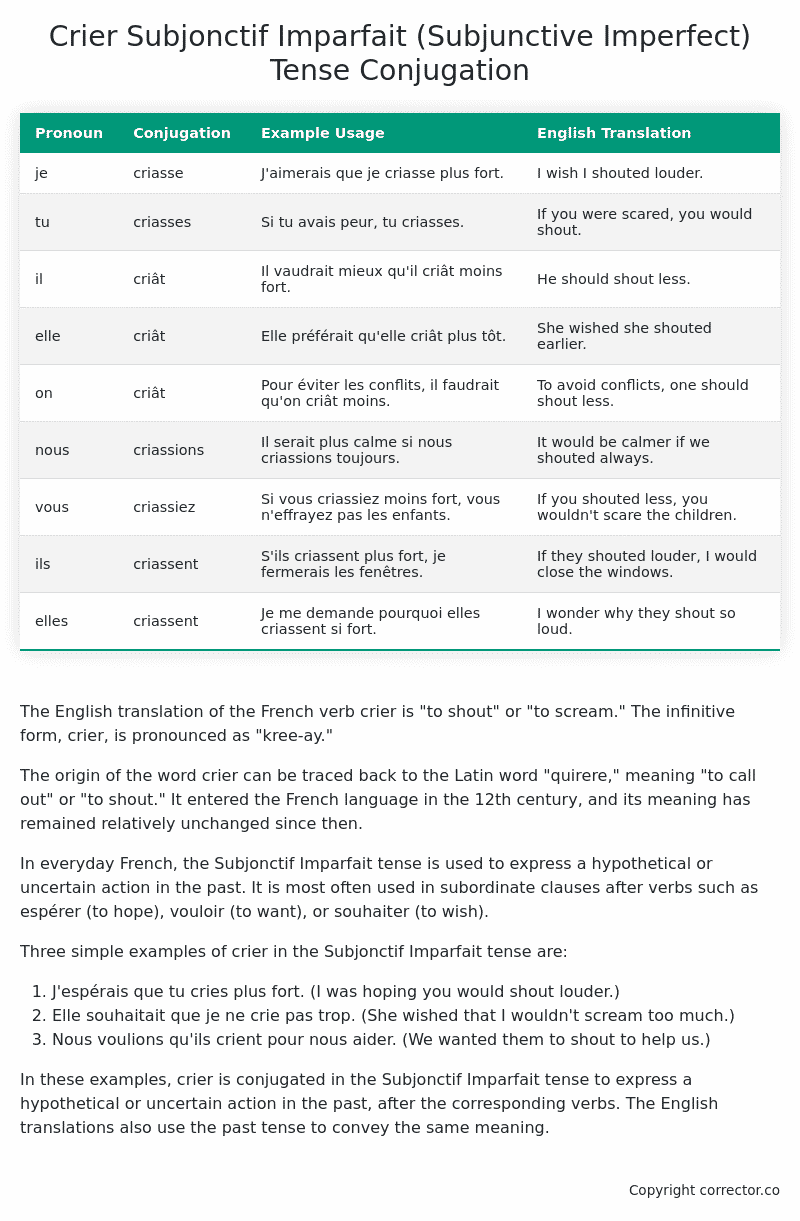Subjonctif Imparfait (Subjunctive Imperfect) Tense Conjugation of the French Verb crier
Introduction to the verb crier
The English translation of the French verb crier is “to shout” or “to scream.” The infinitive form, crier, is pronounced as “kree-ay.”
The origin of the word crier can be traced back to the Latin word “quirere,” meaning “to call out” or “to shout.” It entered the French language in the 12th century, and its meaning has remained relatively unchanged since then.
In everyday French, the Subjonctif Imparfait tense is used to express a hypothetical or uncertain action in the past. It is most often used in subordinate clauses after verbs such as espérer (to hope), vouloir (to want), or souhaiter (to wish).
Three simple examples of crier in the Subjonctif Imparfait tense are:
- J’espérais que tu cries plus fort. (I was hoping you would shout louder.)
- Elle souhaitait que je ne crie pas trop. (She wished that I wouldn’t scream too much.)
- Nous voulions qu’ils crient pour nous aider. (We wanted them to shout to help us.)
In these examples, crier is conjugated in the Subjonctif Imparfait tense to express a hypothetical or uncertain action in the past, after the corresponding verbs. The English translations also use the past tense to convey the same meaning.
Table of the Subjonctif Imparfait (Subjunctive Imperfect) Tense Conjugation of crier
| Pronoun | Conjugation | Example Usage | English Translation |
|---|---|---|---|
| je | criasse | J’aimerais que je criasse plus fort. | I wish I shouted louder. |
| tu | criasses | Si tu avais peur, tu criasses. | If you were scared, you would shout. |
| il | criât | Il vaudrait mieux qu’il criât moins fort. | He should shout less. |
| elle | criât | Elle préférait qu’elle criât plus tôt. | She wished she shouted earlier. |
| on | criât | Pour éviter les conflits, il faudrait qu’on criât moins. | To avoid conflicts, one should shout less. |
| nous | criassions | Il serait plus calme si nous criassions toujours. | It would be calmer if we shouted always. |
| vous | criassiez | Si vous criassiez moins fort, vous n’effrayez pas les enfants. | If you shouted less, you wouldn’t scare the children. |
| ils | criassent | S’ils criassent plus fort, je fermerais les fenêtres. | If they shouted louder, I would close the windows. |
| elles | criassent | Je me demande pourquoi elles criassent si fort. | I wonder why they shout so loud. |
Other Conjugations for Crier.
Le Present (Present Tense) Conjugation of the French Verb crier
Imparfait (Imperfect) Tense Conjugation of the French Verb crier
Passé Simple (Simple Past) Tense Conjugation of the French Verb crier
Passé Composé (Present Perfect) Tense Conjugation of the French Verb crier
Futur Simple (Simple Future) Tense Conjugation of the French Verb crier
Futur Proche (Near Future) Tense Conjugation of the French Verb crier
Plus-que-parfait (Pluperfect) Tense Conjugation of the French Verb crier
Passé Antérieur (Past Anterior) Tense Conjugation of the French Verb crier
Futur Antérieur (Future Anterior) Tense Conjugation of the French Verb crier
Subjonctif Présent (Subjunctive Present) Tense Conjugation of the French Verb crier
Subjonctif Passé (Subjunctive Past) Tense Conjugation of the French Verb crier
Subjonctif Imparfait (Subjunctive Imperfect) Tense Conjugation of the French Verb crier (this article)
Subjonctif Plus-que-parfait (Subjunctive Pluperfect) Tense Conjugation of the French Verb crier
Conditionnel Présent (Conditional Present) Tense Conjugation of the French Verb crier
Conditionnel Passé (Conditional Past) Tense Conjugation of the French Verb crier
L’impératif Présent (Imperative Present) Tense Conjugation of the French Verb crier
L’infinitif Présent (Infinitive Present) Tense Conjugation of the French Verb crier
Struggling with French verbs or the language in general? Why not use our free French Grammar Checker – no registration required!
Get a FREE Download Study Sheet of this Conjugation 🔥
Simply right click the image below, click “save image” and get your free reference for the crier Subjonctif Imparfait tense conjugation!

Crier – About the French Subjonctif Imparfait (Subjunctive Imperfect) Tense
Formation
Common Everyday Usage Patterns
Interactions with Other Tenses
Subjonctif Présent
Indicatif Passé Composé
Conditional
Conditional Perfect
Summary
I hope you enjoyed this article on the verb crier. Still in a learning mood? Check out another TOTALLY random French verb conjugation!


